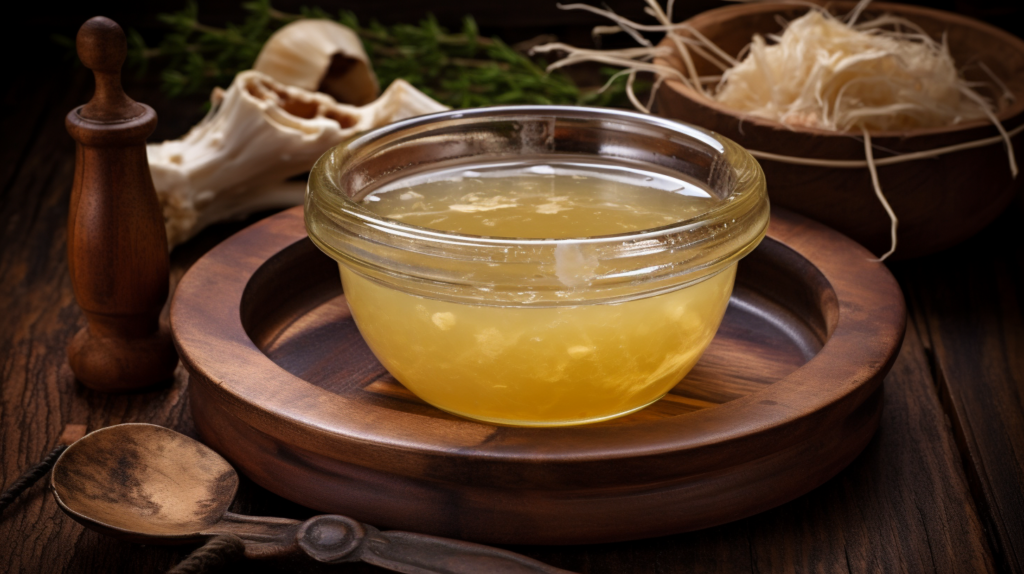If you’re looking for a natural and holistic way to promote gut health and joint strength, bone broth may be the answer. This rich and flavorful broth has been used for centuries as a remedy for various ailments, and recent studies have shown that it can help heal leaky gut, support joint health, and even benefit your skin and immune system.
Bone broth is a nutrient-dense liquid that is made by simmering animal bones, vegetables, and herbs in water for several hours. This slow cooking process allows the bones to release collagen, amino acids, minerals, and vitamins into the broth, creating a flavorful and nutritious drink that is easy to digest and absorb.
If you’re curious about the health benefits of bone broth, read on to learn more about this ancient superfood and how it can support your overall wellness.
Key Takeaways:
- Bone broth is a natural and holistic remedy for healing leaky gut and promoting overall wellness.
- Bone broth is a nutrient-dense liquid made by simmering animal bones, vegetables, and herbs in water for several hours.
- Bone broth is rich in collagen, amino acids, minerals, and vitamins, which can help support gut health, joint strength, skin health, immune function, and more.

What is Bone Broth and its Nutritional Composition?
Bone broth is a nutrient-dense liquid made from simmering bones, vegetables, and herbs for an extended period of time. This process extracts gelatin, collagen, amino acids, minerals, and vitamins, creating a flavorful and nutritious broth.
Bone broth is commonly made using chicken, beef, pork, or fish bones, although other animal bones can also be used. Vegetables such as onions, carrots, and celery are typically added for flavor and nutrients, along with herbs such as bay leaves, thyme, and parsley.
The nutritional composition of bone broth varies depending on the type of bones and vegetables used and the length of time it is simmered. However, bone broth is generally rich in collagen, which supports skin, joint, and gut health. It also contains amino acids such as glycine and proline, which are important for tissue repair and immune function. Additionally, bone broth is a good source of minerals such as calcium, magnesium, and phosphorus, as well as vitamins such as vitamin A and vitamin K.
Bone Broth Benefits for Gut Health
If you’re looking for a natural way to heal your gut and improve your digestion, bone broth may be the answer. The gelatin and collagen in bone broth can help repair and seal the lining of your gut, reducing inflammation and improving overall gut health.
Collagen, in particular, is an essential component of the gut lining, and studies have shown that supplementing with collagen can improve gut health and reduce symptoms of gut disorders such as leaky gut and IBS.
Bone broth also contains amino acids such as glutamine, which have been shown to support gut healing and reduce inflammation. Additionally, the minerals and electrolytes in bone broth can help balance gut bacteria and promote a healthy microbiome, further supporting gut health.
By incorporating bone broth into your diet regularly, you can provide your gut with the nutrients it needs to stay healthy and strong.

Bone Broth Benefits for Joint Strength
If you are looking for a natural way to support your joint health and reduce inflammation, bone broth may be the answer. Bone broth’s rich nutritional composition, including collagen, amino acids, and minerals, can benefit your joints in numerous ways.
Collagen, one of the main components of bone broth, is an essential protein that makes up your joints, tendons, and ligaments. Regularly consuming bone broth can support the health of these tissues. Additionally, the amino acids in bone broth, such as proline and glycine, can help reduce inflammation in the joints, reducing pain and swelling.
Bone broth also contains glucosamine and chondroitin, two compounds that are commonly used in joint health supplements. These compounds can help promote cartilage repair and support overall joint health, making bone broth a natural and holistic alternative to traditional joint health supplements.
How to Incorporate Bone Broth for Joint Health
If you are looking to add bone broth to your diet for joint health, consider consuming it as a warm beverage or using it as a base for soups and stews. You can also use bone broth as a cooking liquid for grains like rice or quinoa.
When choosing bone broth, look for high-quality options that are made with grass-fed and organic ingredients. Additionally, be mindful of your sodium intake, especially if you are consuming store-bought bone broth. If you have any allergies or sensitivities, be sure to consult with a healthcare professional before making any changes to your diet.
Bone Broth Benefits for Skin Health
Bone broth is not only a gut and joint healer but also a beauty booster. The collagen and other nutrients found in bone broth can help improve skin elasticity, reduce wrinkles, and promote a healthy complexion. By regularly consuming bone broth, you can enjoy several benefits for your skin.
Collagen production: Collagen is a protein that is essential for maintaining healthy skin, joints, and connective tissues. Bone broth is an excellent source of collagen, and regularly consuming it can stimulate collagen production in your body, which can help reduce the appearance of fine lines and wrinkles.
Hydration: Bone broth contains a significant amount of water, which can help keep your skin hydrated and plump. Proper hydration is crucial for maintaining healthy skin, and bone broth can help you achieve that from the inside out.
Mineral content: Bone broth is also rich in minerals such as magnesium and potassium, which are essential for maintaining healthy skin. Magnesium helps reduce inflammation, while potassium works to regulate fluid balance in your body, leading to a healthier complexion.
By incorporating bone broth into your diet, you can enjoy the benefits it provides for your skin. Sipping on bone broth or using it as a base for soups and stews can help you achieve a healthier, youthful-looking complexion.

Bone Broth for Weight Loss
If you’re looking to shed some extra pounds, incorporating bone broth into your diet may help you reach your weight loss goals. Because bone broth is low in calories and high in protein, it can help you feel fuller for longer periods, reducing the chances of overeating or snacking between meals.
Moreover, bone broth contains a range of essential nutrients, including amino acids, collagen, and minerals, which support your body’s metabolism and overall health. By including bone broth in your weight loss plan, you can supply your body with the necessary nutrients while keeping your calorie intake in check.
Bone broth is a versatile ingredient that can be used as a base for soups, stews, and sauces. You can also drink it as a warm and comforting beverage, adding herbs and spices for extra flavor. If you’re following popular diets like keto or paleo, bone broth can be a nutritious addition to your meal plan as well.
However, it’s essential to choose high-quality bone broth and avoid excessive sodium levels, which can lead to water retention and bloating. Additionally, bone broth should be consumed as part of a balanced diet, including a variety of whole foods and regular exercise.
Overall, bone broth can be a helpful tool in your weight loss journey, providing satiety, essential nutrients, and a tasty addition to your meals.

Bone Broth for Immune Support
Bone broth has been touted for centuries as the ultimate healing elixir. Its rich mineral and amino acid content make it an ideal food for supporting the immune system and promoting overall health.
One of the key benefits of bone broth for immune support is its ability to stimulate the production of white blood cells, which are responsible for fighting off infections and diseases.
“Bone broth is a great way to support the immune system because it’s rich in amino acids like glycine, proline, and arginine, which help the body produce more white blood cells,” explains Dr. Sarah Ballantyne, a renowned expert on the paleo diet and author of The Paleo Approach.
Additionally, bone broth contains a range of vitamins and minerals that are essential for immune function, such as zinc, selenium, and vitamin C.
The gelatin and collagen in bone broth can also help heal a leaky gut, which is a common issue that can compromise the immune system. By promoting a healthy gut flora, bone broth can help reduce inflammation and prevent chronic diseases.
Overall, bone broth is an excellent addition to any diet, particularly for those looking to support their immune system and prevent illness.

Bone Broth for Healing and Recovery
If you’re recovering from an injury or surgery, bone broth can help speed up the healing process. The nutrients in bone broth, such as collagen, amino acids, and minerals, can support tissue repair and reduce inflammation. Regularly consuming bone broth may also be beneficial for athletes and active individuals as it can aid in muscle recovery and reduce post-workout soreness.
The collagen in bone broth is particularly important for healing and recovery as it helps maintain healthy connective tissues, including skin, joints, and tendons. By including bone broth in your diet, you can stimulate your body’s natural collagen production and promote overall wellness.
For optimal healing and recovery benefits, it’s recommended to consume bone broth regularly, at least a few times a week. You can incorporate bone broth into your diet by drinking it as a warm beverage, using it as a base for soups and stews, or even adding it to smoothies.
It’s important to note that while bone broth has many health benefits, it’s not a replacement for medical treatment or professional advice. If you’re experiencing severe or chronic pain or have any concerns about adding bone broth to your diet, it’s best to consult with a healthcare professional.

Bone Broth for Collagen Production
Bone broth is a rich source of collagen, the most abundant protein in our body. Collagen is responsible for maintaining the structure, elasticity, and strength of our skin, joints, and connective tissues. As we age, our collagen production decreases, leading to wrinkles, joint pain, and loss of mobility. Consuming bone broth regularly can support the body’s natural collagen production and help maintain healthy skin, joints, and connective tissues.
The collagen in bone broth is extracted from the bone and connective tissue during the cooking process. The longer the bones simmer, the more collagen and other nutrients are released into the broth. Therefore, it is important to simmer the bones for at least 12-24 hours to extract the maximum amount of collagen.
By consuming bone broth, you are providing your body with the building blocks it needs to produce collagen naturally. This can be especially beneficial for individuals with joint pain or skin concerns, including acne, wrinkles, and dryness.
In addition to consuming bone broth, there are other ways to support collagen production in the body. Eating a diet rich in protein, vitamin C, and antioxidants can help support collagen synthesis. Avoiding smoking, excessive sun exposure, and a high-sugar diet can also help maintain healthy collagen levels.
Incorporating bone broth into your diet is a simple and delicious way to support collagen production and promote overall wellness.

Incorporating Bone Broth into Your Diet
Now that you know about the amazing health benefits of bone broth, it’s time to incorporate this superfood into your diet. Here are some practical tips:
Making Your Own Bone Broth
One of the most cost-effective ways to consume bone broth is by making your own. This can be done by simmering bones of your choice (such as chicken, beef, or fish) along with vegetables, herbs, and spices in water for several hours. Once cooked, strain the broth and store it in the refrigerator or freezer. You can use your homemade bone broth as a base for soups, stews, and sauces, or enjoy it on its own.
Purchasing Pre-made Bone Broth
If you don’t have time to make your own bone broth, there are plenty of pre-made options available in health food stores and online. Look for high-quality bone broth that uses organic, grass-fed bones and doesn’t contain any harmful additives or preservatives. You can drink the bone broth on its own or use it as a base for soups or stews.
Adding Bone Broth to Recipes
Bone broth can be a versatile ingredient in your cooking. You can add it to almost any dish, from mashed potatoes to roasted vegetables. Bone broth can also be used in place of water in many recipes, adding flavor and nutrition to your meals. For example, you can use bone broth instead of water when cooking rice or quinoa for added nutritional benefits.
Drinking Bone Broth
Drinking bone broth is a great way to boost your nutrient intake and stay hydrated. You can drink bone broth on its own or add seasoning to taste, such as salt, pepper, or turmeric. It can also be consumed warm or cold, depending on your preference.
By incorporating bone broth into your diet, you can experience the many health benefits of this superfood. Whether you make your own bone broth or purchase pre-made options, adding bone broth to your recipes or drinking it on its own is an easy way to support your overall health and well-being.
Potential Side Effects and Precautions
While bone broth offers numerous health benefits, it’s essential to be aware of potential side effects and precautions that come with consuming it.
First and foremost, it’s crucial to source bones from reputable sources to avoid any contamination or exposure to harmful toxins. Additionally, some bone broths may contain excessive amounts of sodium, which can be harmful to those with high blood pressure or other health conditions.
If you have any allergies or sensitivities, it’s essential to be cautious when consuming bone broth. It’s best to consult with a healthcare professional before making significant dietary changes to ensure it’s safe for you.
Furthermore, while bone broth is a nutrient-dense food, it should not be the sole source of nutrition in your diet. It’s essential to incorporate a variety of foods to ensure you’re getting all the nutrients your body needs.
Overall, bone broth can be a healthy addition to your diet, as long as you take the necessary precautions and consume it in moderation.

Conclusion
As you’ve learned, bone broth is a nutrient-rich food that provides a wide range of health benefits. From healing leaky gut and promoting joint strength to supporting weight loss and immune function, bone broth is a natural and holistic approach to wellness.
By incorporating bone broth into your diet, you can enjoy its numerous health benefits while also adding delicious flavor to your meals. Whether you choose to make your own bone broth at home or purchase high-quality store-bought options, be sure to source your bones from reputable sources and be aware of any potential precautions.
Whether you’re looking to improve your gut health, support your joints, or simply boost your overall well-being, bone broth is a valuable addition to any dietary regimen. So why not give it a try and experience the benefits for yourself?
FAQ
Q: How does bone broth naturally heal leaky gut and strengthen joints?
A: Bone broth is rich in gelatin and collagen, which can help repair and seal the lining of the gut, reducing inflammation and improving digestion. It also contains nutrients that support the health of joints, tendons, and ligaments, reducing pain and inflammation and promoting cartilage repair.
Q: What is bone broth and its nutritional composition?
A: Bone broth is a nutritious liquid made by simmering bones, vegetables, and herbs. It contains collagen, amino acids, minerals, and vitamins, providing a wide range of health benefits.
Q: What are the benefits of bone broth for gut health?
A: The gelatin and collagen in bone broth can repair and seal the lining of the gut, reducing inflammation and improving digestion. It also promotes a healthy microbiome, which is essential for gut health.
Q: How does bone broth benefit joint strength?
A: Bone broth contains collagen and amino acids that support the health of joints, tendons, and ligaments. It reduces pain and inflammation and promotes cartilage repair, contributing to stronger and more mobile joints.
Q: What are the benefits of bone broth for skin health?
A: The collagen and other nutrients in bone broth improve skin elasticity, reduce wrinkles, and promote a healthy complexion. It also supports hair and nail health.
Q: Can bone broth help with weight loss?
A: Bone broth can contribute to a healthy weight loss journey by providing satiety, supporting metabolism, and supplying essential nutrients while being low in calories. It is often included in popular diets for weight loss.
Q: How does bone broth support the immune system?
A: The amino acids, minerals, and vitamins in bone broth boost the immune system, strengthening the body’s defense against pathogens. It supports overall wellness and may help prevent and manage common illnesses.
Q: Can bone broth help with healing and recovery?
A: Bone broth promotes healing and recovery by supporting tissue repair, reducing inflammation, and speeding up recovery from injuries or surgeries. It is beneficial for athletes and active individuals.
Q: How does bone broth stimulate collagen production?
A: Bone broth contains nutrients that support the body’s natural collagen synthesis, which is essential for maintaining healthy skin, joints, and connective tissues.
Q: How can I incorporate bone broth into my diet?
A: You can incorporate bone broth into your diet by preparing homemade recipes or purchasing high-quality store-bought options. Add it to soups, stews, sauces, or even drink it as a warm beverage.
Q: Are there any potential side effects or precautions with bone broth?
A: It’s important to source bones from reputable sources to avoid potential contaminants. Excessive sodium intake should be avoided, and individuals with allergies or sensitivities should be cautious. Consulting with a healthcare professional before making significant dietary changes is also recommended.














